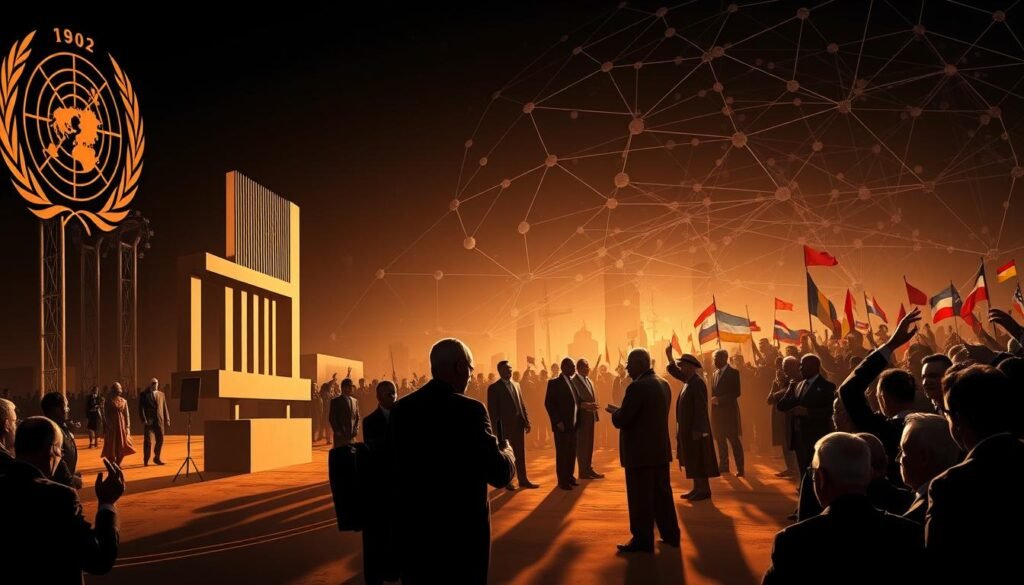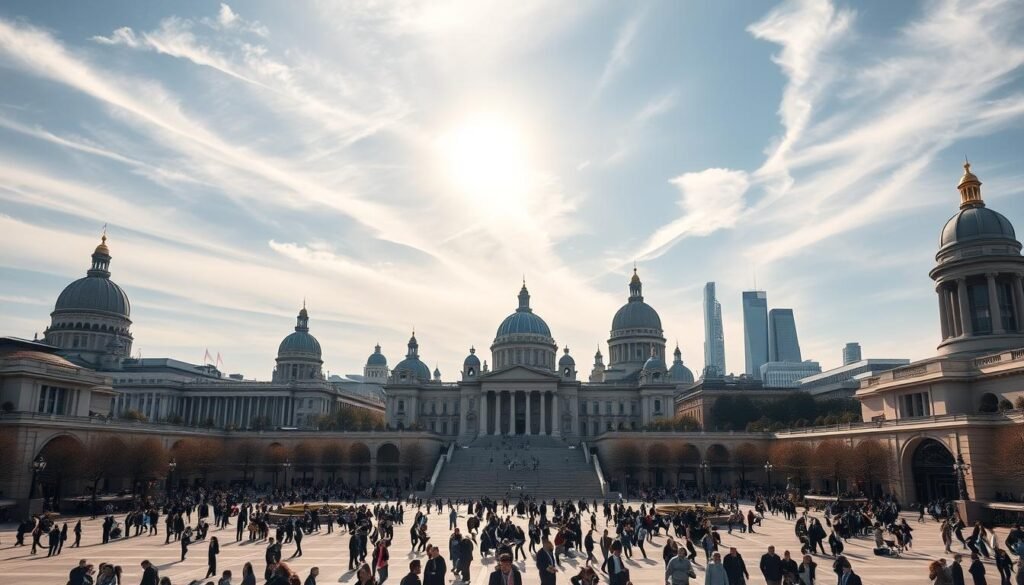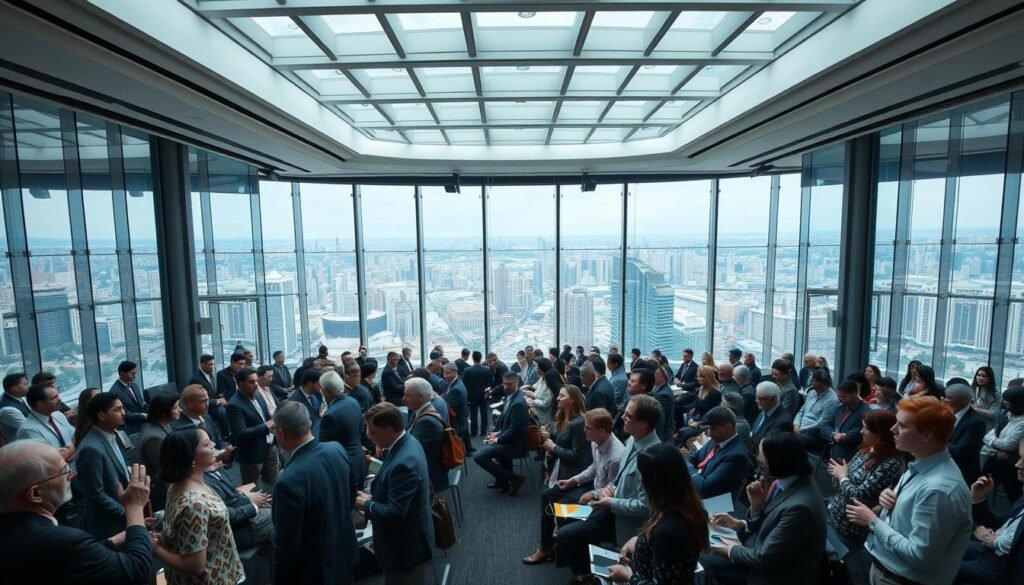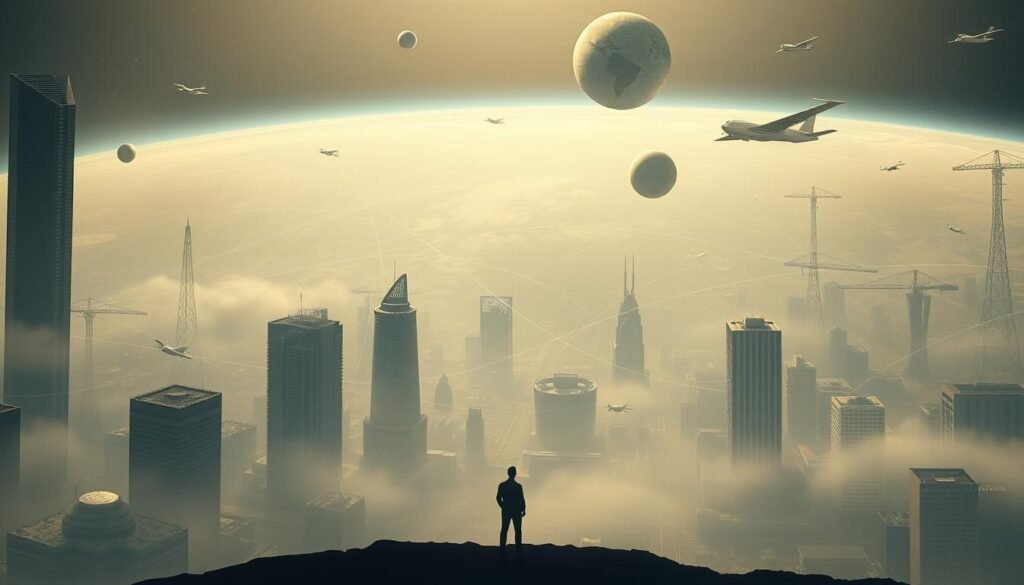The Role of International Law and Institutions in a Multipolar World
Did you know over 90% of international disputes now use international arbitration and legal frameworks? As we move towards a multipolar world, international law and institutions are more important than ever. Our world is complex and connected, needing strong legal tools to handle changing power balances and keep things stable.
We’re looking at how international law and institutions are changing to meet different countries’ needs. In a world where old superpowers are losing influence and new ones like China and India are rising, knowing the role of international law is key. It helps in managing global governance.
Key Takeaways
- Over 90% of disputes are resolved using international arbitration and legal frameworks, showing their big role in global governance.
- The move to a multipolar world means international legal norms need to evolve to keep things stable.
- Rising powers like China and India are key in shaping new international relations.
- Good international law and institutions are vital for keeping global order as power shifts.
- Understanding these legal frameworks is essential for dealing with and preventing conflicts in our interconnected world.
The Historical Context of International Law
International law has been key in keeping nations in order and working together. It started after big wars, when people wanted peace. This led to the creation of groups to enforce these laws.
The United Nations and Its Foundation in 1945
The United Nations (UN) was founded in 1945, a big step for world order. It came from the horrors of World War II, aiming to stop more wars and help countries work together. The UN’s charter set the stage for laws that promote peace, safety, and growth among its members.
The UN is where countries talk and solve global problems. It helped make and grow laws for things like human rights, protecting the environment, and trade.
The Evolution of International Legal Frameworks
The UN’s start helped international laws grow. Over time, these laws have changed to meet new global challenges. They now deal with issues like health crises and new technologies.
These laws have grown to cover many global issues. For example, the International Covenant on Civil and Political Rights and the Paris Agreement show how wide-ranging international law is. They aim to solve today’s problems and prepare for the future.
Shifts in Global Power Dynamics: Moving Towards Multipolarity
The world is changing fast. We’re moving towards a world where many powers matter, not just a few. This change means the West is losing some of its old power. At the same time, China and India are gaining more influence.

The Decline of the West
The West used to be the top dog in the world. It had the strongest armies, economies, and cultures. But now, things are changing. Europe’s economy is slow, and the US is facing new political challenges. This is making room for other countries to step up.
The Rise of China and India
China and India are growing fast. China is building huge projects like the Belt and Road Initiative. India is getting stronger because of its big economy and people. Both countries are getting better at politics and technology too.
This change is big. It’s making the world more complex. China and India are changing how we do things globally. They’re making the West rethink its role in the world.
| Factors | Decline of the West | Rise of China | Rise of India |
|---|---|---|---|
| Economy | Stagnation, financial crises | Expansive growth, global investments | Rapid growth, large workforce |
| Political Influence | Shifting political landscapes, internal divisions | Growing global presence, strategic partnerships | Increasing political clout, regional influence |
| Technology | Steady innovation | Leading advancements in various sectors | Emerging tech hub, software industry boom |
International Law and Its Universal Application
In today’s world, following international law is harder than ever. The idea of universality aims to make sure all countries follow the same rules. But, different interests and power struggles often get in the way. The idea of sovereign equality helps keep things balanced between big and small countries.
Challenges to Universality
One big problem is that countries don’t always follow international rules the same way. Some stick to agreements closely, while others pick and choose based on what’s best for them. This makes it hard to achieve universality in international law.
Geopolitical tensions also make things worse. For example, when Western countries use sanctions, it can look like they’re playing politics. This can make other countries feel like the rules aren’t fair. It shows how hard it is to have one set of rules for everyone in a world where power is always changing.
The Role of Sovereign Equality in a Multipolar World
In our world with many powerful countries, the idea of sovereign equality is key. It says every country, no matter its size or strength, should have a say in global decisions. The United Nations General Assembly shows this, with every country having one vote.
But, making this idea work in real life is tough. Even though all countries are supposed to be equal, big countries often have more say. This can make smaller countries feel like they’re not being treated fairly. So, it’s important for global organizations to make sure everyone is treated equally.
In the end, the goals of universality and sovereign equality are at the heart of international law. But, making them real in our world needs hard work and dedication from every country.
Key Institutions in International Governance
In today’s world, it’s key to know about key institutions in international governance. These groups help countries work together smoothly. They handle global issues with skill and care. Let’s look at the main groups that shape our world today.

The table below shows what these key institutions do, how they affect us, and how they change with the times:
| Institution | Founded | Primary Functions | Impact | Adaptations in a Multipolar World |
|---|---|---|---|---|
| United Nations (UN) | 1945 | Peacekeeping, conflict resolution, international law | High influence on global peace and security | Increasing engagement with emerging powers |
| International Monetary Fund (IMF) | 1944 | Monetary cooperation, financial stability | Stabilizes currencies, provides financial aid | Adapting policies to include emerging markets |
| World Trade Organization (WTO) | 1995 | Regulating international trade | Promotes free trade, resolves disputes | Evolving trade agreements for new economies |
| World Health Organization (WHO) | 1948 | Global health initiatives, disease control | Coordinates international health policy | Enhanced pandemic response strategies |
These key institutions are flexible and important in our changing world. They keep improving to handle the challenges of a multipolar world.
The Role of International Regulatory Bodies
International regulatory bodies like the IMF and WTO are key in the world’s economic cooperation. They help set and keep rules for global trade and economic policies. This lets countries deal with the challenges of a world with many powerful players.
International Monetary Fund (IMF)
The International Monetary Fund (IMF) keeps the world’s finances stable. It watches over global economies and gives advice to help countries stay financially healthy. The IMF also helps countries with money problems, working together to solve them.
World Trade Organization (WTO)
The World Trade Organization (WTO) is vital for managing international trade. It helps countries make trade agreements and solve trade disputes. The WTO’s rules make trade safer and more predictable, helping the economy grow.
The roles of the IMF and WTO are indispensable in global economic governance, helping to facilitate cooperation and resolve disputes among diverse multinational stakeholders.
International Treaties and Agreements
Exploring international treaties and agreements shows their key role in keeping the world stable and nations working together. These agreements help nations share goals and solve problems peacefully.
Multinational Conventions
Multinational conventions are key examples of global teamwork. They tackle big issues like climate change, trade rules, and protecting human rights. The Paris Agreement on climate and the Convention on the Elimination of All Forms of Discrimination Against Women are notable examples.
These conventions help nations work together on big problems. They make sure everyone agrees and follows the same rules.
Mechanisms of Enforcement
One important part of international treaties and agreements is how they are enforced. Strong enforcement makes sure countries keep their promises. This includes checks, dispute solving, and penalties for breaking rules.
The International Criminal Court (ICC) is key in enforcing laws against serious crimes. The World Trade Organization (WTO) also has a system to solve trade disputes through talks and court.
Having strong enforcement mechanisms makes multinational conventions and agreements work better. It helps countries stick to their promises and keeps the world stable.
Influence of Transnational Organizations
Transnational organizations play a huge role in shaping international law and policy. They are key players in global and regional governance. They help member states work together on issues like economic policies and human rights.
The European Union (EU)
The European Union is a major player worldwide. It has 27 member countries and works to boost economic cooperation and political stability in Europe. The EU’s laws and policies greatly affect international trade, environmental rules, and human rights.

The European Union has paved the way for unprecedented integration, setting a benchmark for what transnational organizations can achieve when member states work cohesively.
The African Union (AU)
The African Union is also key in promoting peace, security, and economic growth in Africa. It was founded in 2001 to unite African states and drive sustainable growth. The AU focuses on solving conflicts, protecting human rights, and improving governance.
In conclusion, the European Union and the African Union show the big impact of transnational organizations. They help with regional stability, economic growth, and global policies. This highlights the need for working together in our connected world.
The Challenge of Nuclear Non-Proliferation in a Multipolar World
In today’s world, stopping nuclear weapons from spreading is a big challenge. It needs everyone working together. The old rules from the Cold War don’t fit today’s complex world anymore. Countries like China, India, and Russia are now key players in talks about nuclear weapons.
The Treaty on the Non-Proliferation of Nuclear Weapons (NPT) is a key part of stopping nuclear weapons from spreading. But, it’s not enough for today’s threats. We need better talks and strict rules to keep up with new challenges.

The table below shows how different countries are doing on stopping nuclear weapons:
| Country | Treaties Signed | Recent Initiatives | Challenges Ahead |
|---|---|---|---|
| United States | NPT, New START | Modernization of arsenal, treaties with Russia | Balancing deterrence and disarmament |
| China | NPT | Expansion of nuclear capabilities | Lack of transparency in nuclear policy |
| Russia | NPT, New START | Cooperation with U.S. on arms control | Political tensions with the West |
| India | Not a signatory of NPT | Continued development of nuclear arsenal | Regional tensions with Pakistan |
We must keep working together to stop nuclear weapons from spreading. A world with many powers needs smart plans and strong teamwork. By talking well and following rules, we can make a safer world without nuclear threats.
Regionalism and Its Impact on Global Governance
Regionalism is key in shaping today’s global governance. It brings countries together to tackle big challenges. East Asia and post-Soviet states show how regionalism changes global rules.
Regional Orders in East Asia
In East Asia, regionalism is seen in economic deals, security plans, and political partnerships. Countries work together for economic growth, with ASEAN leading the way. This teamwork boosts trade and strengthens diplomatic bonds, helping global governance.
Case Study: Post-Soviet States
Post-Soviet states show regionalism’s power after the Soviet Union fell. They faced big governance hurdles. Regional efforts helped stabilize their economies, improve security, and build political ties.
Regional groups like the Eurasian Economic Union show regionalism’s role in global governance. East Asia and post-Soviet states prove regionalism is more than just being close. It’s a strategic move that shapes our world.
The Use of Force in International Affairs
The use of force in international affairs is guided by a complex set of legal rules. These rules aim to balance a country’s sovereignty with the need for global peace and security. They ensure that force is used responsibly and only when justified, following the guidelines of bodies like the United Nations.
International Legal Norms Governing Use of Force
The UN Charter strictly regulates the use of force. It allows force only in self-defense or when the Security Council authorizes it to keep or restore peace and security. This rule is meant to stop countries from taking military action alone. It makes sure any force used follows international law.
Recent Case Studies
In recent years, the use of force has been tested against these legal norms. For example, NATO’s intervention in Libya was under UN Security Council Resolution 1973. It aimed to protect civilians during the Libyan Civil War. But Russia’s military action in Ukraine, without UN approval, has been widely criticized for breaking these rules.
The US’s targeted strike on ISIS leaders was seen as justified under self-defense and fighting terrorism. The way these rules are applied and interpreted is constantly changing. This affects how countries use force in international affairs.
Influence of Diplomatic Relations on International Law
Diplomatic relations are key in shaping international law. They help create frameworks for cooperation and solving conflicts between states. Through diplomatic talks, countries make agreements and treaties that shape international law.
These talks are vital for setting rules on peacekeeping, trade, and human rights. They help create laws that everyone must follow.
The United Nations’ founding in 1945 is a big example of successful diplomacy. It shows how countries can work together for peace. Member states have made and updated laws to tackle global problems.
They’ve worked on big issues like climate change and humanitarian law. This shows how diplomacy leads to strong international laws.
Negotiating treaties involves many steps, from talks to ratification. Each step is shaped by a country’s diplomatic history and policies. Diplomacy helps find common ground, making laws more accepted and followed.
To illustrate:
| Diplomatic Relation | International Law Outcome |
|---|---|
| Post-War Cooperation | Establishment of the United Nations |
| Environmental Diplomacy | Paris Agreement |
| Humanitarian Diplomacy | Geneva Conventions |
In conclusion, diplomatic relations drive the growth of international law. As countries deal with global issues, their diplomacy shapes the laws we follow. This shows their dedication to working together for a peaceful world.
The United Nations Security Council’s Role
The United Nations Security Council plays a key role in keeping the world peaceful. It works hard to stop fights, solve problems, and bring countries together. This is vital for global stability.
Looking at how the Council makes decisions, we see the importance of power and talking things through. The five permanent members—China, France, Russia, the United Kingdom, and the United States—have a big say. They can veto any decision, which is why they must agree.
The United Nations Security Council does many things, as shown in the table below:
| Function | Description | Key Actions |
|---|---|---|
| Peacekeeping | Deployment of multinational peacekeeping forces to conflict zones. | Monitoring ceasefires, protecting civilians. |
| Sanctions | Imposing economic or diplomatic penalties to enforce international law. | Trade restrictions, asset freezes. |
| Conflict Resolution | Mediation and negotiation to resolve disputes. | Facilitating peace talks, arbitration. |
| Legislative | Establishing international legal norms. | Formulating resolutions and binding decisions. |
The United Nations Security Council also shapes global security by being ready to change and act fast. It must be able to quickly respond to new threats. This ensures peace is kept around the world.
International Legal Scholarship: Orthodox Generalists vs Political Activists
In the world of international legal scholarship, we see a clear divide. Orthodox generalists and political activists each bring their own methods and views. They shape how we understand and use legal theory globally.
Defining Characteristics
Orthodox generalists stick to well-established rules, valuing consistency and universality in international law. They focus on keeping the integrity of long-standing legal norms and principles.
Political activists, on the other hand, focus on today’s social and political issues. They are critical, aiming to change and improve current legal systems to fight global injustices.
Contributions to Legal Theory
Both groups make important contributions to legal theory. Orthodox generalists strengthen the core of international law, ensuring stability and predictability. Their work helps nations operate in a stable legal environment.
Political activists, by contrast, challenge traditional legal thinking. They push for reforms and innovations to address injustices and highlight human rights. Together, their work makes international legal scholarship strong and dynamic.
The Interplay Between Power and Law in Global Governance
In the complex world of *global governance*, the mix of *power* and *law* is key. This mix shapes our world. It affects how international policies are made and followed.
Power can change how laws are seen and used. This creates a tricky situation where laws both guide and bend to power.
Looking into this mix means understanding how power can both follow and go around global laws. Big players like the United States, China, and the European Union use their power to shape *law* for their benefit. This makes us wonder if international rules are fair and for everyone.
*Law* also helps balance power in *global governance*. It gives smaller countries a way to stand up against bigger ones. International courts, like the International Court of Justice, try to solve disputes fairly, even when there’s a big power gap.
The mix of *power* and *law* gets even more complicated with groups like big companies and non-governmental organizations (INGOs). These groups have a lot of power and can shape policies. So, *laws* change to deal with or control these powerful groups, showing how *global governance* keeps changing.
For example, in climate change agreements, big countries and companies have a lot of say. But the laws that come out of this are key for fighting climate change. This shows how *law* can both come from and limit power.
In the end, the mix of power and *law* in *global governance* shows a constant battle between influence and rules. Getting this mix is key to understanding how international policies are made and their global effects.
Conclusion
International law in a multipolar world is complex and always changing. The United Nations and key agreements are key to keeping peace and order. They help nations work together.
The rise of China and India changes how we see power. This shift makes us question how international law works. It shows how important it is for all nations to be treated equally.
Looking to the future, institutions like the International Monetary Fund and the World Trade Organization are very important. They help shape how the world is governed. As we tackle big issues like nuclear non-proliferation, our work will show if international law can help us live in harmony.
FAQ
What is the role of international law and institutions in a multipolar world?
International law and institutions are key in keeping the world stable. They help countries work together, solve conflicts, and follow agreements. This is important in a world where power is spread out.
How was the United Nations founded and what was its primary objective?
The United Nations started in 1945 to promote peace and security. It marked a new era of global cooperation.
How have international legal frameworks evolved over time?
International law has changed a lot over time. It has grown to fit new global situations. Despite changes, it keeps trying to be fair for everyone.
What implications does the decline of Western dominance have on international law?
The decline of Western power affects international law. New powers like China and India are changing how things work. This means we need a fairer system for everyone.
What are the main challenges to the universal application of international law?
Applying international law everywhere is hard. Different interests, enforcing laws, and the idea that all countries are equal make it tough. These issues make it hard to follow the law fairly.
How does the principle of sovereign equality function in a multipolar world?
Sovereign equality means all countries have the same rights. But in a world with many powers, it’s hard to follow. Countries struggle to get their voices heard.
What are some key institutions in international governance?
Important institutions include the United Nations, the International Monetary Fund, and the World Trade Organization. Also, groups like the European Union and the African Union play big roles. They help manage global issues.
What roles do the IMF and WTO play in global governance?
The IMF and WTO help countries work together economically. They set rules for trade and money. This keeps the economy stable.
How are multinational treaties and conventions enforced?
Treaties are enforced through diplomacy, sanctions, and courts. These tools help keep agreements strong. They make sure everyone follows the rules.
What influence do regional transnational organizations have on international law?
Groups like the EU and AU shape law and policy. They help make rules in their areas. This affects global rules too.
What are the current challenges of nuclear non-proliferation in a multipolar world?
Stopping nuclear spread is hard today. Different interests and enforcing laws are big challenges. Treaties are key to solving these problems.
How do regional dynamics impact global governance?
Local situations shape global policies. For example, what happens in East Asia or post-Soviet areas matters. They show how local issues affect the world.
What are the international legal norms governing the use of force?
Laws say you can’t use force unless it’s self-defense or with UN permission. Recent examples show how these rules are applied in real situations.
How do diplomatic relations shape international law?
Diplomacy shapes law through cooperation and solving conflicts. It affects how laws are made and followed. This drives changes in international law.
What is the role of the UN Security Council in maintaining international peace and security?
The UN Security Council makes key decisions on peace and security. It decides on actions like sanctions and peacekeeping. Its decisions are influenced by its members’ politics.
What are the distinct approaches of orthodox generalists and political activists in international legal scholarship?
Orthodox generalists focus on traditional law. Political activists look at law’s role in social issues. Both help shape legal theories.
How does the interplay between power and law affect global governance?
Power and law interact in global governance. This shapes how laws are used and changed. It shows how power affects fairness and effectiveness in international law.




